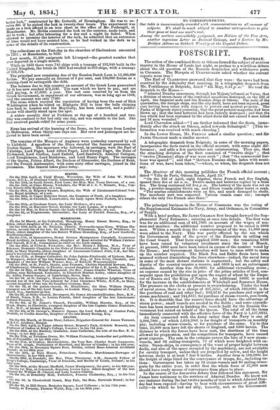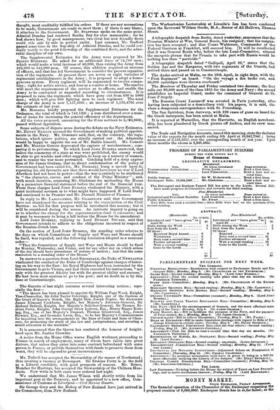The principal business in the House of Commons was the
voting of the Supplemental Estimates for Navy, Army, and Ordnance, in Committee of Supply. With a brief preface, Sir JAMES Go a TTAAL first brought forward the Sup- plemental Navy Estimates; entering at once into details. The first vote was for an additional sum of 461,7001. on account of the wages of sea- men and marines : the additional number proposed to be raised is 5000 men. Within a month from the commencement of the war, 11,000 men were added to the Navy. This was partly effected by the use which the Government made of the power of the Executive in calling out the Coast Guard. That force supplied 2500 men ; the remaining 8500 have been raised by voluntary enrolment since the 1st of March. At present, 1000 men have been raised in excess of the number voted by the House ; and Government therefore will have to raise 4000 to make up the number required. The Black Sea and Baltic fleets have been manned without diminishing the force elsewhere—indeed, the naval force in some of the most distant stations is augmented; but the safety and dignity of the country require a reserve, and 5000 is not an extravagant estimate. Another item was 50,0001. for additional victualling stores ; an expense caused by the rise in price of the prime articles of food, con- sequent upon the prohibition put upon the export of wheat by the Empe- ror of Russia and the King of Naples. An additional 50001. is needed for the increase in the establishments at Whitehall and Somerset House. The pressure on the clerks at present is overwhelming. Under the head of naval stores, there is a charge of 697,3311., of which 160,0001. is for the purchase of coal and other fuel; 252,6741. for purchase and repair of steam machinery; and 244,6571. for purchase of steam-vessels, gun-boats, &c. It is desirable that the reserve force should have the advantage of steam power; small vessels are needed in the Baltic ; and some expendi- ture has been incurred in finishing the vessels !built for the Russian Go- vernment but seized on behalf of the Queen. The total of all the items immediately connected with the effective force of the Navy is 1,457,0311. An item connected with the Army rather than the Bevy is one of 3,096,700/. ; of which 2,610,2001. is for freight of transports on monthly pay, including steam-vessels, or for purchase of the same. Up to thus time, 25,000 men have left the shores of England, and 2500 horses. The distance to which the forces have been sent, the shortness of the time allowed for preparation, and the competition for transports, have caused great expense. The sum in the estimate covers the hire of 8 new steam- vessels, Mad 86 sailing-transports, 75 of which were freighted with ca- valry. Steam-ships, in consequence of the want of proper height between decks, and also of the space occupied by the machinery, are not available for cavalry transport, unless they are propelled by screw, and the height between decks is at least 7 feet 6 inches. Another item is 108,0001. for the freight of ships hired for the conveyance of troops, &c., including ra- tions : Government has taken up 18 steam-vessels and 86 sailing-trans- ports for the entire year, in order that the whole force of 27,000 men should have ready means of conveyance from place to place.
In the course of the discursive debate that followed this statement, Sir James bore testimony to the services of Admiral Dundee. He knew not one instance during the last twelve months of trial to which Admiral Dun- des had been exposed—having to bear with circumstances of great diffi- culty—in which he had not ably, honestly, and, as the Government
thought, most creditably fulfilled his orders. If there are any accusations to be made, Government are ready to meet them ; if there is any blame, it attaches to the Government. Mr. STAFFORD spoke on the same point. Admiral Dandas had rendered Besika Bay for ever memorable ; for he had shown how, by good management, two rival but now friendly fleets could ride aide by side in perfect amity. Last summer, Mr. Stafford passed some time in the flag-ship of Admiral Dundas, and he could cor- dially testify to the good fellowship of the combined fleets, and the admi- rable discipline of our own.
The Supplemental Estimates for the Army were proposed by Mr. SIDNEY HERBERT. He asked for an additional force of 14,799 men ; which would make a total increase of 40,000, thus raising the Army from 102,000 to 142,000 men. Of course, this addition required an increase of officers, and that has led Government to consider the present organiza- tion of the regiments. At present there are seven or eight varieties of regimental establishments in the Army ; it is proposed to adopt a homo- geneous system. Every regiment will be augmented to twelve compa- nies ; eight for active service, and four as a reserve at home. The reserve will meet the requirements of the service as to officers, and enable the Array to be contracted or expanded according to circumstances. It is proposed to raise the regiments which have gone out from 850 to 1000 men; which will give 800 fighting men to each regiment. The total charge of the Army is now 7,157,4861. ; an increase of 1,132,4701. over the estimate of last year. Mr. MoNsELL briefly proposed the Supplemental Estimates for the Ordnance, the total of which is 742,1321. ; a sum distributed over a num- ber of items for increasing the general eliciency of the department.
All the votes proposed, amounting for the three services to 5095,8631., passed without opposition.
Some subjects of dispute arose during the debate on the Navy Estimates. Mr. HENRY BAILLIE accused the Government of making political appoint- ments in the Navy. Mr. OSBORNE said, that, on the contrary, the regu- lations, which ignore politics, are strictly carried out : the Admiralty would be happy to appoint the son of Mr. Bailie himself. Mr. COBDEN and Mr. MINER GIBSON deprecated the capture of merchantmen com- paring it to privateering. To which Lord JOHN RUSSELL answered, that unless the commerce of a state at war were prohibited, the enemy would be able to get warlike and other supplies, to keep up a nursery of seamen, and to render the war more protracted. Catching hold of a stray ezpres- _Rion of Sir James Graham, that no direct condemnation of the policy of Government had been called for, Mr. DISRAELI hung a speech upon it; repeating his old favourite saw that there would have been no war if Lord Aberdeen had not been in power—that the war is entirely to be attributed to " the character, career, and conduct of the Prime Minister" ; and, with much iteration, censuring Mr. Gladstone for misleading the louse by a premature financial statement before the end of the financial year. From these charges Lord Joan RUSSELL vindicated the Ministry, with a quiet incidental sarcasm as to what might have happened If Lord Derby Lad continued to be Premier and Mr. Disraeli Minister of Finance.
In reply to Mr. LABOUCHERE, Mr. GLADSTONE said that Government have not abandoned the measure relating to the organization of the Civil Service : no bill for that purpose will be introduced this session; but it will be considered during the recess. An intricate inquiry is going on as to whether the charge for the superannuation fund is excessive; and it may be necessary to bring a bill before the House for its amendment. Lord Joni; RUSSELL, replying to Lord DUDLEY STUART, said that Government intends to adhere to the obligations incurred in respect of the Russian-Dutch loan.
On the motion of Lord Ionic Russo-is, the standing order relative to the days on which Committees of Supply and Ways and Means should be fixed, was repealed, and the following resolution adopted as a sessional order— "That the Committees of Supply and Ways and Means should be fixed for Monday, Wednesday, and Friday, and for any other day on which orders of the day should have precedence of notices of motion ; and that the same resolution be a standing order of the House."
In answer to a question from Lord REDESDALE, the Duke of NEWCASTLE vindicated the conduct of the Duke of Cambridge against charges of loiter- ing on his way to the East : his Royal Highness had been instructed by the Government to go to Vienna, and had there executed his instructions, "not only with the greatest fidelity but with the greatest ability and success." He had been most anxious to go to his post ; and no doubt he is by this time at Constantinople.



























 Previous page
Previous page